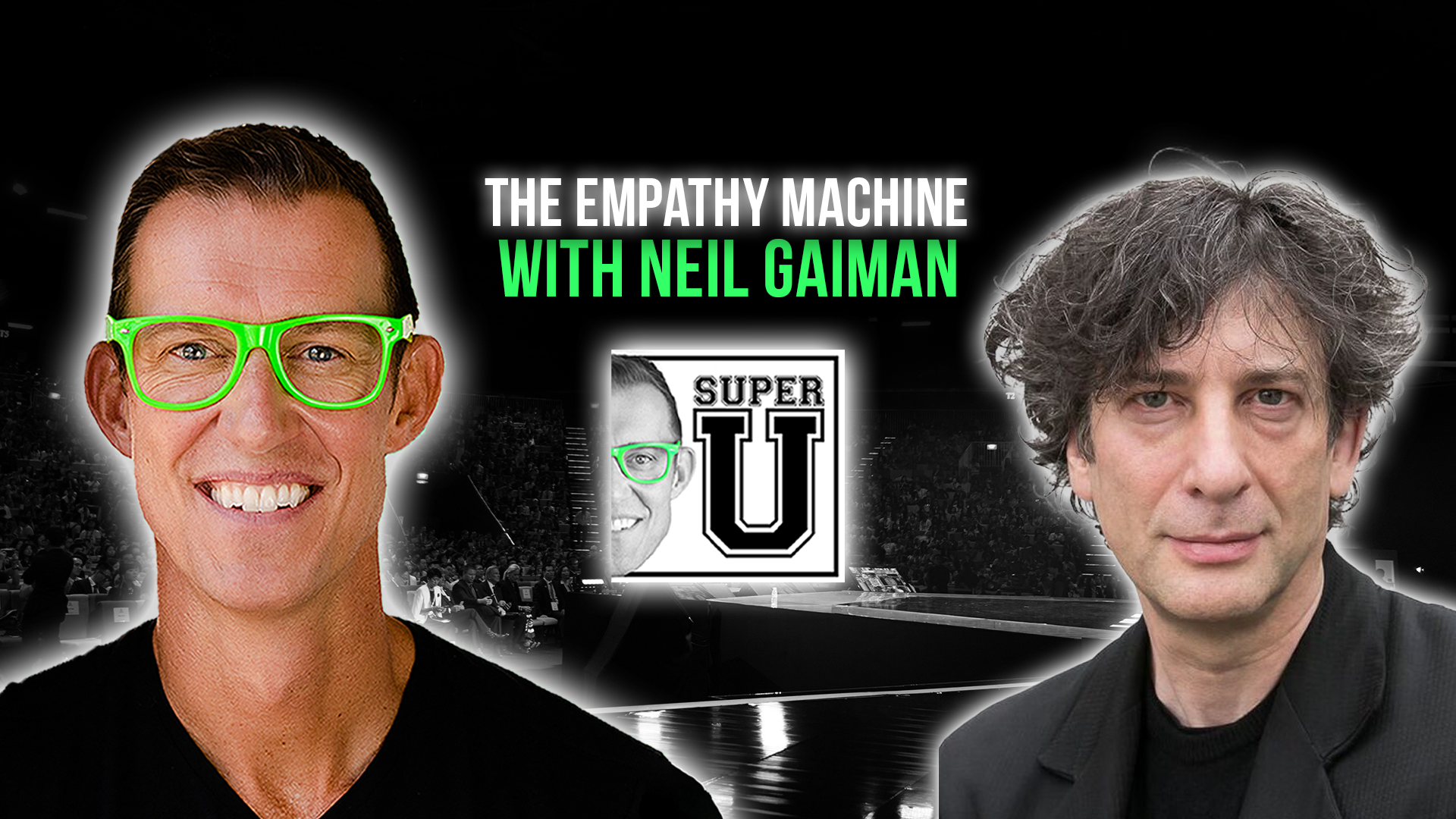The Empathy Machine with Neil Gaiman
Today, you’ll be hearing from Neil Gaiman. Gaiman is the author of short fiction, novels, comic books, graphic novels, audio theatre, and screenplays. His works include the comic book series The Sandman and the novels Good Omens, and Coraline. He co-created the TV series adaptions of Good Omens and The Sandman. His work has been honored with many awards internationally, including the Newbery and Carnegie Medals. In this episode, Gaiman offers tips on reinventing yourself, recognizing great art, making up your own rules, and much more.
Need a sneak peek? Below are the main takeaways from the episode.
The Empathy Machine with Neil Gaiman
Tip #1
“I’ve always thought of fiction as being an empathy machine. Fiction is a way of putting us inside other people’s heads. It’s a way of letting us look out through eyes that are not our own. feeling the beating of other people’s hearts of experiencing other people’s thoughts of going into lives that we have not lived. And I think that is one of the functions that fiction serves. Being a machine for empathy is probably the most important, you know, once you get inside somebody’s head. And that point, there is there is a bridge at that point in communication at that point improvement is possible.”
Tip #2
“Most of the time, not always, I will do my first draft in fountain pen. Because I actually enjoy the process of writing with a fountain pen. I like the filling a fountain pen, I like uncapping it, I like the weight of it in my hand, I like that. So I’ll have a notebook. I’ll have a fountain pen. And I’ll write if I’m doing anything alone. If I’m working on a novel, for example. I will always have two fountain pens on the go, at least with two different colored inks, at least. Because that way, I can see at a glance how much work I did that day. I can just look down and go look at those five pages in brown that I wrote that half a page in black, that was not a good day. nine pages in blue. And that was it. What a great day. And you can just sort of get a sense of Okay, are you? Are you working? Are you making forward progress? What’s actually happening? And I also love that because it emphasizes for me that nobody is ever meant to read your first draft, your first draft can go way off the rails, and your first draft can absolutely go up in flames. You can change the age, gender number of a character. You can bring somebody dead back to life. Nobody ever needs to know anything that happens in your first draft. Are you telling the story to yourself? And then I’ll sit down and type.”
Tip #3
“I was a young journalist. And I used to interview a lot of writers as a young journalist. And one of the things that made me really sad was a, I was 2223 24. And talking to people who were household names. And, but they’d be household names, writing one kind of thing, detective fiction or Science Fiction or thrillers or whatever. And you talk to them, not during the interview. But normally when you go out for a meal afterward or in the pub afterward. And they’d start talking about you know, I’ve got this great French Revolution novel that nobody published. Or, you know, a really good novel, I’ve written about a riverboat race, and the Mississippi and I, nobody really wants it, and I’m gonna beat your sound so and they go, Yeah, but I’m, I’m a crime writer, and it’s not a crime novel. So there was definitely even back then the idea that I did not want ever to be pigeonholed as a writer who only did one thing I wanted to. If I was going to be a writer, I had to be allowed to do whatever the next book was. Normally, the reason why I don’t go off and do the next book, is because faced with the choice between, on the one hand, doing something that I’ve learned how to do, I know how to do and the people are waiting for. And on the other hand, doing something, I have no idea whether I can pull off or not, and that nobody wants. I will always go for this hand.”
Tip #4
“I used to be really good at working on multiple projects at once. I think I have to start I think I have to start accepting that I’m not as good anymore at that. In the old days, when I was young, I would have at least three things on the go, which was great, because if I got stuck on any one of them, I would do the other. Even when I was writing American Gods, I would always have the next of the sort of the coming to America short stories in my head. So if I got stuck on Shadow, I would just take a week and do one of the Coming to America stories. And then I go back to shadow again, and but these days, I don’t think I’m as good at that anymore. I think I am. I think it’s great to have three or four things going on. But there is that point where I start looking at myself and going actually, I’m getting less done. I’m not doing that thing where I get stuck on Project Day. So I just immediately nip over a project B, it takes me a little ramping up time to get to the headspace now, Project B. And at the point where I have projects A, B, C, and D all waiting for me, what I do is look at them making noise like lurch from the Addams Family, you know, and those kinds of noises, like making a cup of tea in a play with ash or something. So I think actually, it’s one of those things where you just know thyself, I think I now have to start going just one thing at a time.”
Tip #5
“I was in China a few years ago, and I was talking to my Chinese publisher. And I said, Why is it that none of my picture books are in print in simple Chinese? On the mainland, my picture books are all in print from Taiwan and Hong Kong, but nothing on the mainland. And they said, Ah, well, it’s because they show a lack of respect for the family unit on the part of the children and lack of respect for authority. And children question authority in them. And they do bad things. And they’re not punished, either. Okay. So then it became a point of honor for me that I had to do a story in which all of those things happened. That would get published in mainland China. And I decided I would write a book about a baby panda Who sneezed. So I did a book called Tuesday. And at that point, you know, you know, you’re writing for children. You also know that whenever you’re writing for children, you’re writing for adults, and you’re writing for adults, that is, if a kid likes a book, if the little kid likes a book, it’s not that you’re gonna have to read that book once a week, you may have to read that book four times a night. For eight months or a year. There are books that I read to my kids that are imprinted. On the back of my head was one called Catch the Red Bus about a father bear taking his family with various colored modes of transportation to the seaside, which is not great literature, I could recite it all still to this day. So you’re always aware of the adult readership. Sometimes you’re writing things for kids. What I try and do is right for me, if I’m writing for kids, and just sort of go What did I like when I was that age? Not even what I like trying to look back at it? But what is the what is what is the seven-year-old inside me? Like? What is the nine-year-old? What is the 11-year-old like? And that kind of works? Treating things with that kind of respect.”
Tip #6
“Great art for me is anything that provokes a deep emotional reaction at the time that you hear it and then you can’t get out of your head and then you go back you experience something completely different to the thing you experienced the first time. And whether it’s a painting or a piece of music, or a book or whatever, it’s that thing where you with a book, it’s that moment where you put it down, and you go, that I’m not quite the same person that I was, before I read that book, I’m not the same person that I was, before I saw this painting that for me is greater. And furthermore, I’m not sure that there is any piece of art good, bad, mediocre, great, or ridiculous, that has been made in the history of this planet, that absolutely everybody would agree is great art. You know, somebody’s beautiful painting is somebody else’s paint, you know, somebody else’s door being a piece of transcendent music is somebody else’s caterwauling. And that’s wonderful. And that actually is the magic trick that allows artists of any kind to make a living is the fact that not everybody likes the same thing that everybody you know, we have a, we have our likes and our dislikes is magical. That’s fantastic.”
Tip #7
“I say we’re in a transitional world right now, if you’re in any kind of artistic field, because the nature of distribution is changing the models by which creators got their work out into the world, and got to keep a roof over their heads and buy sandwiches while they did that are all changing. I’ve talked to people at the top of the food chain and publishing and bookselling in all those areas. And nobody knows what the landscape will look like two years from now, let alone a decade away. The distribution channels that people have built over the last century or so are in flux for print for visual artists, musicians for creative people of all kinds, which is, on the one hand, intimidating, and then the other immensely liberating, the rules, the assumptions, and now we’re supposed to as of how you get your work seen and what you do, then a breaking down the gatekeepers are leaving their gates, you can be as creative as you need to be to get your work seen. I say nobody knows the old rules are crumbling, nobody knows what the new rules are. So make up your own rules. And, I would go further, I think that I would steal a metaphor from Cory Doctorow. I used it recently, which is, you know, do lots of things. Try lots of things. In the comparison of dandelion seeds think dandelion seeds, dandelions, and mammals, traditionally spend a lot of time building a new mammal like them, it’s a lot of time and investment in food and investment, everything, dandelions, just have a head with lots of dandelions, and they let them go. And the idea is that some of them will survive. Most of them won’t survive, but that’s okay. Because a few dandelion seeds are gonna go off and they will make more down below. And I would counsel people to think like that now starting off in the world, that we’re in this peculiar world, where we don’t know what the rules are, everything’s changing. So, do lots and lots of little trial projects, do lots, send your trial balloons out, and float your dandelion seeds. Absolutely be happy for five things that you do to fail. If one succeeds, and one succeeds well.”
Connect with Neil Gaiman:
X: @neilhimself
Instagram: @neilhimself
Youtube: https://www.youtube.com/c/neilgaiman
Facebook: https://www.facebook.com/neilgaiman/

To ensure you don’t miss future episodes, subscribe to our podcast by clicking here >> Super U Podcast. We hope these tips help unlock and unleash your inner superpower!
The Super U Podcast is hosted by #1 bestselling author and Motivational Speaker Erik Qualman.





